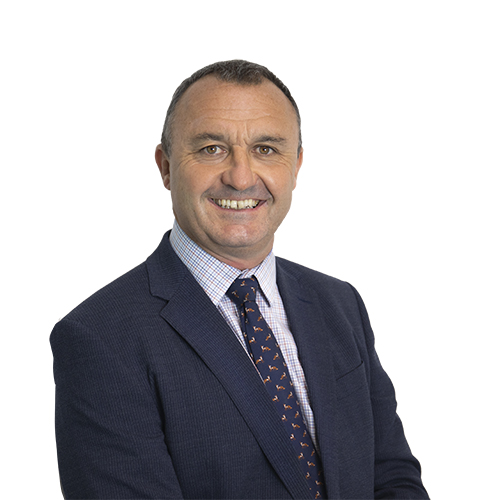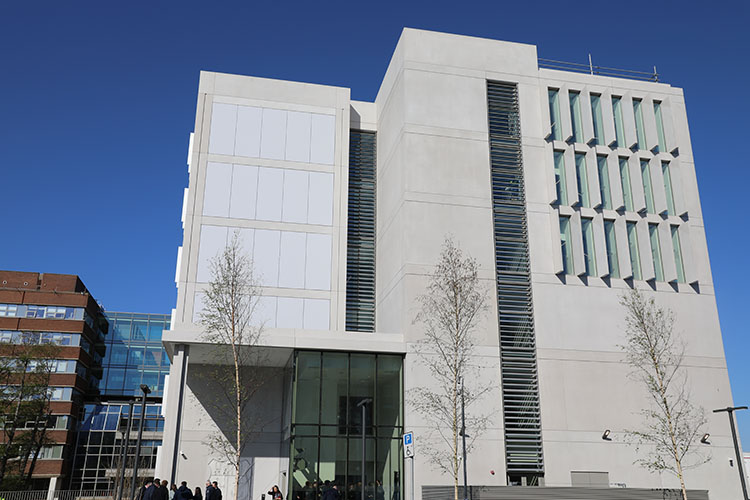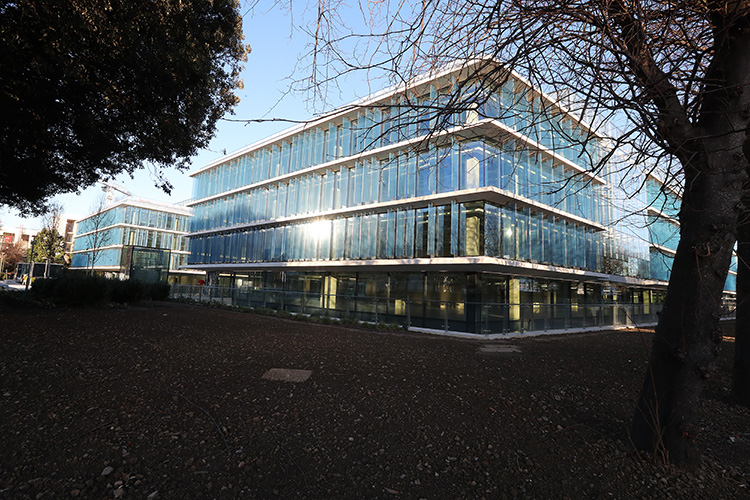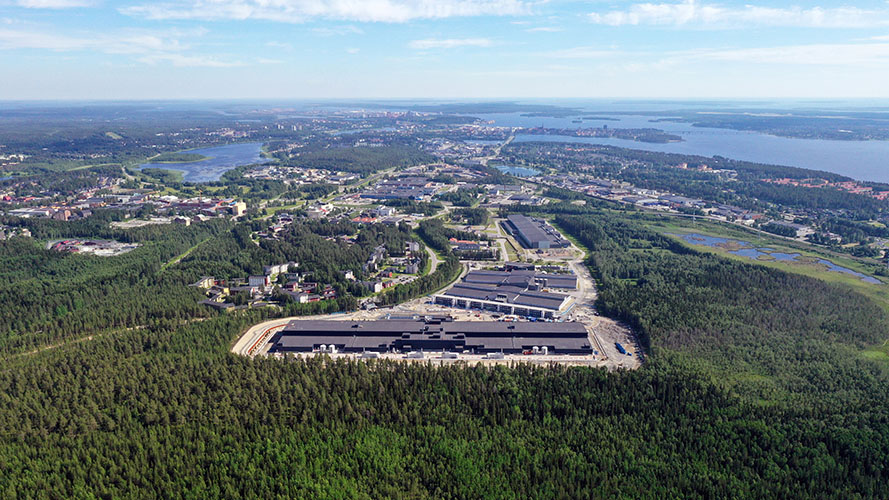Breaking New Ground

Paul Brown, CEO, John Sisk & Son, speaks to BARRY MCCALL about the contractor’s new business strategy, how it is modernising its operations to meet future needs, and what the sector as a whole should be doing to encourage more young men and women to pursue careers in construction.
Having taken on the role of John Sisk & Son (Sisk) CEO in 2022, Paul Brown took time out to learn more about the business he had been working in for the previous nine years. “I had spent eight years leading Sisk’s UK business and ran the civil engineering business in Ireland for a few years as well,” Paul Brown explains. “I thought I knew the business really well, but looking back now and reflecting on it, it was an even stronger business than I thought. I have spent a lot of time familiarising myself with the company’s operations in Ireland and Europe, and it’s been a really positive first 18 months.”
There have been a few negatives as well, though.
“We spent quite a bit of time closing down some legacy jobs in some countries where we operate,” he explains. “Some of the ones in the UK were decades old. We have managed to successfully close most of them down. In parallel with that, we took the opportunity to deal with the Covid-related challenges which the business was facing.”
Key Sisk appointments
That put the business on a strong footing for 2023 and beyond.
“We are now in the strongest position we have ever been in terms of workflow and pipeline,” Brown continues. “We made some tweaks to the structure. The life sciences and data centre businesses had been part of the general building business in Ireland. We made the decision to put them into a stand-alone position. This has removed some constraints, and we are seeing really good profitable growth in both. We have also consolidated all of our general construction activity under one division in Ireland.”
Several key appointments accompanied those changes.
“Steven McGee became chief operating officer for Ireland in May of 2022, having spent half of his career with Sisk in the UK. Donal McCarthy is chief operating officer for the Life Sciences and Data Centres division, and we have doubled turnover and increased profitability in both areas. The new division will help to generate better routes to growth. And Ajaz Shafi is now the chief operating officer for the UK business, having taken over my old job there.”
Sisk’s other division is services, which includes its Vision Built offsite manufacturing business and rail business in the UK.
“The overall business performed very well in 2022,” Paul Brown adds. “We had really strong revenues of €1.7bn last year, and we are on target to exceed €2bn this year. But the real focus for us is on the bottom line. It’s a question of having the right clients in the right sectors by focusing on the work we take on and having a good mix of private and public sector clients.”

Sisk team bog restoration with Green Restoration Ireland (GRI), Co Mayo.
A new strategy
Paul Brown has also led the development of a new strategy for the company, ‘Breaking New Ground’. “Our new strategy is centred around modernising the business for future needs,” he explains. “It will address macro factors, such as decarbonisation, offsite construction and people, and it will help ensure the business remains relevant for the next 20 years.”
The strategy comprises five core components – people and culture; net zero; digital transformation; modern methods of construction (MMC); and quality of earnings.
“Under people and culture, we are trying to be the best possible employer we can be. We are looking at ourselves and how we retain and attract the best people. Net zero requires a change of culture and mindset. Supporting the sustainability agenda is not without its challenges. It is both a societal and environmental challenge, and Sisk needs to be a leader in addressing these issues.”
Digital transformation is all about productivity, he notes. “It’s about utilising the best tools and technologies, upskilling our people, and changing the culture of the business to improve productivity.”
He points out that the construction industry has been innovating and embracing offsite construction for many years, but MMC is more important now than ever before due to skills shortages. “We have the in-house capability with our Vision Built business, but it’s all about getting the balance right.”
Quality of earnings is of crucial importance. It focuses on not chasing revenue for revenue’s sake. “We want to work with the right clients in the right areas and close the gaps in that where they exist.”
The softer side is important as well.
“Sisk is a very old business, and we held focus groups and roadshows to find out how our people feel about it. What came through was a very strong sense of purpose. There is also a strong sense of legacy and a very strong sense of public service from the founders right through to the present day. We don’t have a crystal ball to foresee what will happen in the next 10, 20 or 30 years. We know there will be change, and our vision is to be at the heart of that change by being as innovative and forward-thinking as we can be.”
While excellence in building will remain at the core of the Sisk business, it is important to Paul Brown that the perception of the company changes. “As we add more services, we will become more than a building contractor,” he points out. “The pace of change is remarkable, but we will embrace it. Our clients will demand that of us. We want to make sure the business has the best chance of being relevant in all of its markets in 20 years.”

Sustainability at Sisk
Decarbonisation will involve seeking new ways to reduce the climate impact of the construction industry’s outputs. Brown explains that it will require a number of different approaches, including making more informed design choices and seeking new ways of decarbonising the supply chain, as well as looking for sustainable alternatives to concrete and steel.
“Will that ever get us to where we need to be?” he asks. “Cross-laminated timber will help to replace some steel. Recycling will also help. And the industry will follow where technologies go. Ireland can seize the opportunity to lead the change in that area. The imperative to achieve net zero targets is not going away. We will be punished for not achieving them. It’s a choice at the moment, but not for much longer.”
He believes the switch to fuel alternatives like hydrogenated vegetable oil (HVO) will probably only be a short- to medium-term fix at best. “EVs won’t solve the problem either. We are already discussing hydrogen-powered machinery.”
Addressing the skills gap
There are no quick or easy solutions to the skills shortage either.
“Sisk has always been a big supporter of skills development,” he continues. “We are also trying to make careers in construction as attractive as possible. The industry doesn’t attract enough females and people from diverse backgrounds. We are trying to unlock those pools of talent, and we’ve invested a lot in our equality, diversity and inclusion programme. We are also targeting colleges and universities to get our message across. But we need to do it as an industry. I sat on the board of Build UK, where there was great collaboration on issues like this. I am delighted to see a shift to more pooling of resources here.”
There is a need to communicate what the industry is now and where it’s going, he adds.
“The industry should be more attractive to school leavers, but we don’t showcase it properly. It offers the opportunity to work on exciting high-tech projects all over Europe.
“Looking ahead, there is no reason why we shouldn’t have a much higher proportion of females in the industry. Digitalisation and MMC are changing the nature of the industry by bringing about a more controlled environment. The levels of attrition are much lower as a result. People are producing construction products in a manufacturing environment. It’s fantastic to see so many females working in our Vision Built facility. They come in with little or no experience, but after two months of training, they are working on a production line. Before this, they would have found it difficult to find a route into the construction industry.
“There are lots of other things we also need to do. We continue to invest in our apprenticeship programme, for example.”

Reverse engineering
Quality of earnings is all about being a bit more choosy when it comes to deciding which projects to tender for. Paul Brown explains that poor project and client selection follows from a failure to follow a business’s own red lines when it comes to what contracts are acceptable. Other aspects include poor quality in supply chains and its impact on returns and margins.
For Brown, it’s a question of learning from experience. “We have reverse-engineered all the things that hit us over the past 10 years and incorporated that into the strategy. When we look back, we can see that 90% of our earnings were good quality over that period, but when it was bad, it was very bad. We need to get that 10% down to as near zero as possible. We will achieve that through better knowledge management and learning from our mistakes. There is a lot more learning and sharing we should do together.”
He accepts that eliminating poor-quality earnings will be an extremely difficult proposition. “We will always have bad contracts here and there,” he notes. “The key is to try to manage them out by putting the right controls in place.”
Looking ahead
Looking to the period ahead, Paul Brown believes the future is bright for Sisk, notwithstanding global factors.
“What happens with the war in Ukraine will have an impact, and, hopefully, we will see an end to that in the next year or so,” he comments. “From our perspective, we will continue to build on our strengths. Our life sciences and data centres division is going from strength to strength, and we are getting close to having the right blend of clients.”
That blend is important as the focus is on the bottom line rather than simply growing revenue.
“We are not driven by revenue, and we are under no pressure from our shareholders to grow it. We will right-size the business and will continue to grow our service capability to support business growth. We could grow revenue by €300m to €350m over the next 18 months, but there is a lot of inflation in those numbers as well. I see my own function as to cement our position in the market and continue to deliver a sustainable return for the business and our shareholders,” Paul Brown concludes.



